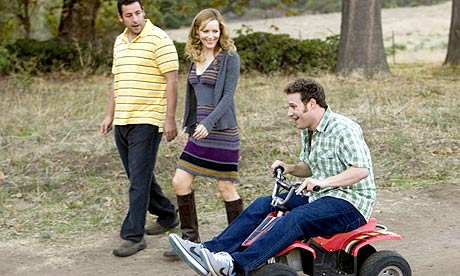
Weighed down by a depressing premise made all too apparent by the theatrical trailer and advance publicity which made the film’s title too obviously sarcastic, Jud Apatow’s Funny People opened relatively poorly at the U.S. box office, taking in only $23.4 million. That was good enough to finish at the top of the heap for the weekend, but was the lowest number one opener since Yes Man last year.
Funny People showed much less audience draw than the great majority of Apatow’s and actor Adam Sandler’s previous efforts, and its failure to connect big with audiences cannot be blamed on any recent disappointments. Apatow’s Knocked Up and Sandler’s Bedtime Stories were both excellent films that did very well at the box office.
The magnitude of the disappointment for the Funny People writer-director and its star was summed up well by Reuters:
* This will likely be the eighth straight movie that Apatow produced that failed to top $100 million. ("Step Brothers" and "You Don’t Mess With the Zohan," the latter of which he also wrote, just reached the mark but didn’t surpass it.)
* Opening weekend has been a hallmark of Apatow in his robust years. But only two of these past eight films opened to at least $30 million — after the three previous pictures all did.
* This month marks exactly two years since Apatow Prods. had a bona fide breakout along the lines of a "Talladega Nights" or "The 40-Year-Old Virgin" — the Greg Mottola-directed "Superbad," which earned $121 million.
* After "Virgin" and "Knocked Up," Apatow was touted for his rare ability to bring overseas audiences to U.S. comedies. That was then, this is now. Outside of "Zohan," none of his previous seven pictures have topped $150 million internationally. "Funny People" isn’t likely to change that.
I haven’t yet seen the film, but it seems likely that this is a misstep on Apatow’s part and not a portent of inevitable things to come. It’s always tempting for comedians to attempt overtly serious projects, but Funny People is nothing like Woody Allen’s lugobrious and overwrought Interiors.It’s clear that Apatow tried to be funny in this film, and the inclusion of serious themes is certainly in line with the other films he has directed, The Forty-Year-Old Virgin and Knocked Up.
Sandler, of course, has done films such as Punch-Drunk Love and Spanglish but always managed to get back to what he does best. Both Sandler and Apatow have exemplified the contemporary habit of conveying positive ideas and moral messages through works of culture employing vulgar and trashy surface elements. The shortcoming of Funny People was an evident failure to assure audiences that the vulgarity and messages would be placed in an enjoyable dramatic and comic context.
That suggests that Funny People is more of a bump in the road for both filmmakers, and that they’ll both be able to move forward from the relative disappointment of their current film. However, the trailers and other publicity for their next project will have to make it clear that it offers audiences the same sort of enjoyment and edification their previous films have given.
Filmmakers in general must learn that vulgarity, explicit sexual content, absurd story lines, mad violence, and the like are not what appeal to most of their audience. Filmgoers attend movies with such content because of the other good things in the films, specifically the positive messages and aesthetic enjoyment to be found behind the trashy surface nonsense. Emphasizing the former is the way to both artistic and audience success.
In a culture that openly celebrates vulgarity, mistaking it for authenticity, it’s difficult for artisans and audiences alike to see what really makes for good culture, including good popular culture. But the market sends strong signals, and filmmakers and other culturemakers do well to listen and learn.
–S. T. Karnick

Yes, that’s a very good point, Fred. We don’t want or need censorship imposed by either government or the industry, but we should work to help culturemakers see what works best, for their own sake and the good of the audience. That’s what we’re here for.
And it’s also important to lead by example, as you and your band Glass Hammer do so admirably.
And it’s certainly not that I’m advocating the imposition of such limits on artists from outside. Apatow would do well though, IMHO, to recognize how well he does under such restrictions.
I think you’re right, Fred, to note that artistic constraints are often good for artistry. As I and others have noted before, the Hollywood Production Code (which limited what could be depicted in wide-release theatrical films during the 1930s until the early ’60s) actually made films better by forcing filmmakers to be inventive in the absence of many forms of sensationalism. The same was true of television during the 1950s through the early ’70s.
The relaxation of standards of decency enables culturemakers to rely on sensationalistic and vulgar subject matter to lure audiences, instead of creating strong drama and truly enjoyable comedy.
It’s true, of course, that extraordinarily talented filmmakers can make great films that go into territory that would be sheer vulgarity in less-skilled hands. However, few culuremakers really seem to benefit from weakened standards of decency.
I think Apatow has done himself a disservice by freeing himself from the constraints of TV. Both Freaks & Geeks and Undeclared were brilliant and totally free of the self-indulgences he has displayed in his feature films- mainly vulgarity (occasionally hilarious but tiring when used to total excess) and long running times (freeing him from some judicious editing). A lot of this may also have to do with him flying solo and not collaborating with Jake Kasdan (who made the criminally underrated Zero Effect).